If you started keeping ducks recently, congratulations, you’re joining the ranks of many homesteaders who are coming around to the advantages and benefits of them as poultry. But compared to chickens, ducks have a decidedly different diet.
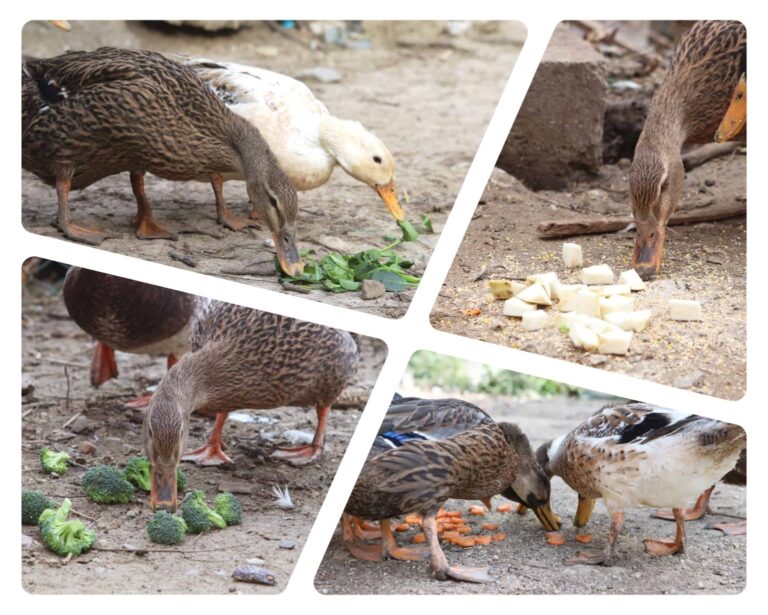
Don’t get me wrong, they eat a wide variety of foods, and you won’t be short of options for things to feed them as you will soon learn, but you’ve also got to know what they should never have!
To help you feed your ducks the foods that they crave and need I’m bringing you a list of things your ducks should eat and that they should avoid.
What Does a Typical Duck Diet Look Like?
Out of the wild, ducks have a varied diet like they do in captivity but most of the foods they eat are either aquatic in nature or terrestrial foods that are typically found near water sources. This just makes sense, of course, since ducks spend much of their life on or near the water.
Some of ducks’ most favorite foods, and also the most important ones in their diet, are plants. Ducks eat different kinds of grass, fresh leaves, and buds from various plants and of course aquatic plants like cattails, duckweed, water lilies, and others.
Speaking of foods that come from the water, ducks really love to eat tiny fish like minnows and a variety of crustaceans like shrimp, crayfish, and other waterborne creatures. Insects, both adults like beetles, dragonflies, water bugs, and more, along with insect nymphs and larvae are likewise a very important source of protein.
Other than that, ducks are opportunistic eaters of just about anything else they can catch and swallow, including other creepy crawlies like snails, slugs, and mollusks but also a variety of nuts and seeds, wild fruit that they can easily reach or that has fallen from trees, worms, frogs, frog eggs, and more.
By understanding the natural diet of ducks this can better inform our own menu selections for them in captivity.
Things Ducks Can Eat
The following items are all things that ducks can have as part of their usual diet. Note, though, that you’re always best to give ducks a nutritionally balanced duck feed as the cornerstone of their menu, and supplement it with the following whole and fresh foods.
Animal Protein
Mealworms
No surprises here, ducks love mealworms just like chickens and basically every other bird that eats animal protein. Mealworms are a great source of protein, fat, and other nutrients.
Shrimp
Your ducks probably won’t get too much shrimp unless you have a stream or lake on your property, but you can feed it to them as a protein supplement or treat.
Crayfish
Small crayfish are another great animal protein option for your flock. They also furnish many important vitamins and minerals that ducks need and might not get in their diet otherwise. Think twice before feeding large, live crayfish because their claws can hurt your ducks.
Insects
Again, no surprise. Ducks love to eat insects, and if you let them free-range and forage they will find plenty of their own as they roam. You can also get a variety of beetles, flies, and other critters from suppliers to feed to them.
Insect Larvae
Adult insects are just fine for your birds, but so are their young in the form of larvae. Various kinds of grubs make a great, protein-packed option for ducks. This is all that mealworms are, actually!
Slugs
If you have slug problems on your property, your ducks can be your best friends in the battle. Slugs are an easily digested protein source for waterfowl, and they’ll be more than happy to eradicate them whenever they find them.
Snails
Snails are very much like slugs as far as ducks care, only they’re a little bit crunchier. As long as the snails are small enough, their shells won’t cause a problem and can be easily broken up in the ducks’ gizzard.
Fish
Most kinds of ducks don’t eat as many fish as most people think, but they do indeed eat fish, particularly small minnows and similar species. They’re a wonderful source of protein, healthy fats and oils, and trace elements.
Grain
Ducks eat grains, and if left to their own devices they will eat a whole lot of them. They can be a great source of calories and energy, and a surprisingly good source of minerals, but you have to watch the quantity because they can cause significant weight gain and digestive issues.
Cracked Corn
Corn, now as ever, can serve as a livestock feed. But to avoid problems, you only want to give your ducks small quantities of cracked corn.
It can be a very good warming feed, for helping them during the molt or helping them get over stress. Don’t overdo it, and don’t give them whole dried corn because it can cause impaction problems.
Oats
Oats are sweet, tasty, highly nutritious, and easy to digest as far as grains go. A really good choice for your flock on a limited basis.
Wheat
Wheat is another good grain choice that ducks tend to love. Given in moderation, it can supply tons of vitamins and is a good source of energy, though not quite as good as corn.
Quinoa
Quinoa is a remarkable grain, or rather it’s treated like a grain- it’s actually a tiny seed that is one of the most nutritionally complete vegetarian proteins around. It is a wonderful all-around supplement for ducks, but may be expensive.
Barley
Barley is something you might not eat a lot of yourself, but ask any farmer that grows it and they will tell you that ducks love it.
Millet
Millet is commonly eaten by many kinds of birds, and not just waterfowl. Lots of songbirds eat the stuff up, but all you need to know is it is a decently nutritious choice for ducks.
Fruit
Ducks do not get as much fruit in the wild as you might think, and they don’t particularly seek it out. They can eat it, and get good nutrition from it, but all you need to know is that they absolutely love the stuff. Fruit can make a wonderful treat or occasional supplement to their usual diet.
Cranberries
Cranberries are one of the fruits that ducks are most likely to encounter, considering how much time they spend on the water. They don’t mind the tartness at all, but like all fruits, watch the quantity because of the sugar content.
Kiwi
Kiwis are an odd choice of fruit for ducks, but a safe one that they really like. It’s also soft and easily digestible and is a good cross-section of nutrients that can benefit them.
Papaya
There’s no reason your ducks can’t enjoy a little bit of tropical fruit! Papaya is soft and easy for them to swallow, and not as sweet as some other fruits, making it a fine choice for a treat. Don’t’ feed it to them if it’s spoiled, though!
Plums
In my experience, ducks love plums, and you can feed them to your flock without concerns but you definitely need to remove the pit because it’s a choking and crop or gizzard impaction hazard.
Cherries
Cherries are another good sweet snack for your flock, but you already know what I’m going to say by now: make sure you remove the pit and go easy on the quantity because they are so sweet.
Honeydew Melon
Melons are some of the best fruit options for ducks, and honeydew is among the very best. It is firm but soft enough for them to eat easily, highly digestible, nutritious, and has relatively low sugar content.
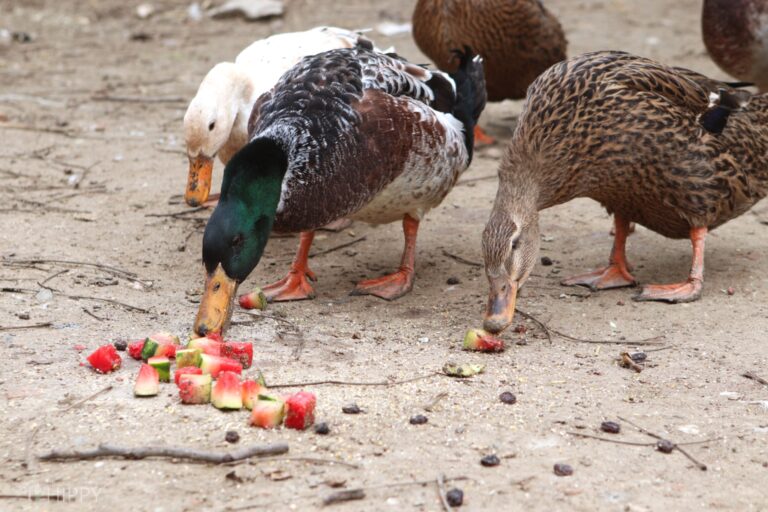
Watermelon
Watermelon is arguably the king of melons, at least as far as people are concerned, but it’s also a delicious and super hydrating sweet snack for birds. Assuming you aren’t dealing with jumbo seeds or tiny ducks, they can also eat the seeds without worry.
Apples
An apple a day might not keep the vet away, but a few pieces a week will make your ducks happy. Remove the core and the seeds. The seeds contain compounds that are toxic to ducks if they eat too many.
Pears
Pears are basically like a softer, sweeter apple as far as our birds are concerned. They are nutritious and tasty, but just like apples, you must remove the core and the seeds prior to feeding.
Bananas
There’s something about the notion of a duck eating a banana that is just hilarious to me. Nonetheless, they can eat them and tend to enjoy them.
I recommend you remove the peel because they aren’t very nutritious and can potentially be a choking hazard – even though they should be safe for them to ingest.
And here’s another tip: give them green bananas that are firm and not as sweet for best results. Bananas are an excellent source of potassium and other nutrients.
Peaches
When it comes to fruit, it hardly gets better than a perfectly ripe, sticky, sweet peach. They aren’t the most nutritious food around, but your ducks will adore the taste. Make sure you remove that large, hard pit because they can’t eat that safely.
Strawberries
Strawberries are among the most beloved fruits eaten around the world, and this is another variety that ducks could conceivably get fairly regularly in the wild. They can eat every part, including the little green crown.
Blackberries
As with cranberries, ducks will in fact eat berries while out in the wild. Blackberries are a great option being highly nutritious and not terribly sugary.
Raspberries
Raspberries, like blackberries above, are 100% okay for your ducks. Just mind the quantity as with every other kind of fruit on our list.
Blueberries
Blueberries are another good berry for ducks, but sweeter than the others we’ve talked about, so you’ll want to restrict the quantity even more. They have beneficial antioxidants, though, which can give them a good health boost!
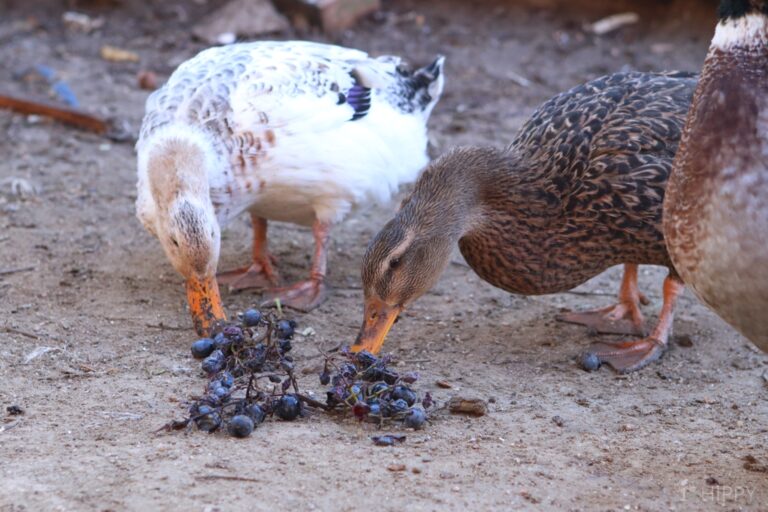
Grapes
Ducks might love grapes more than any other fruit. There’s just something about them that they go crazy for.
They’re a wonderful training aid, bribe, or all-purpose treat for your birds, but resist the temptation to feed them too many. As healthy as they are, they are way too sweet for your ducks to get in abundance.
Vegetables
Ducks can certainly eat veggies as a supplemental part of their diet, though some kinds will require more preparation from you than others.
Pumpkins
Obviously, ducks will have a very hard time breaking into a pumpkin, but if you bust it open and carve out the flesh on the inside into small pieces that they can handle, they’ll love it.
Radishes
Radishes are a nutritious, healthy veggie for ducks, but unless they are eating the greens, you’ve got to cut it up into small pieces or potentially even cook it lightly so they can swallow it.
Beets
Just like radishes, beets are a nutritious veggie that ducks love, but they can’t eat it as is. Cut up into small pieces prior to serving and consider lightly cooking it.
Okra
Ducks can eat okra as long as it’s cut up into small bites that are easy to swallow. They cannot safely swallow a whole, intact pod.
Bok Choy
This cabbage-like veggie is totally fine for ducks and remarkably nutritious. Serve it to the masses in small quantities or as a component in mixed greens.
Artichokes
Shockingly, artichokes are okay for ducks to eat but it’s not something they can handle raw. Cut it up into small bites and steam it so it is soft and appropriately sized for swallowing.
Turnips
Turnips are like beets and radishes above: good for ducks and nutritious, but way too hard for them to eat as is. You know the drill. Cut it up into small pieces and soften it prior to serving.
Butternut Squash
Squash is a highly nutritious and easily digestible vegetable that your flock will go crazy for. If it’s very ripe and soft, you can chunk it and let them dip and swallow, otherwise lightly steam it and let it cool prior to serving.
Lettuce
Ducks can eat most varieties of lettuce safely on a limited basis, and they are both hydrating and nutritious. But go easy on the quantities because too much lettuce can give them diarrhea.
Arugula
Arugula is a noteworthy variety of lettuce, one especially good for ducks, being packed with an assortment of vitamins and minerals they need to thrive. They also really seem to love that peppery flavor.
Cucumber
Cucumber is tender, crisp, and very hydrating. A great snack for your ducks!
Sweet Potato
Sweet potato is one of those foods that you need to prepare to make it palatable for your flock. I recommend you cook it until it’s just soft and then cut it up into small pieces. It’s a great source of vitamins and minerals.
Peas
All kinds of peas are safe for ducks to eat, but make sure you remove them from their pods to prevent them from being a choking hazard.
Greens
All sorts of vegetable greens are an excellent nutritional supplement for ducks, and a wonderful way to round out their menu and make sure they’re getting all the micronutrients they need. Collard, mustard, beet, radish, turnip and other greens are all okay.
Herbs
Just like greens, ducks can eat all sorts of herbs. They tend to be highly digestible and most are very appealing to our birds. Fresh, live herbs particularly tend to be extremely nutritious. Parsley, mint, basil, rosemary, oregano, dill, sage and fennel are great, healthy options.
Other
Other foods that are just fine for your birds, but don’t fit in the above categories.
Waterfowl / Gamebird Feed
As mentioned, your ducks should be subsisting primarily on a nutritionally complete waterfowl or gamebird feed that’s appropriate to their phase of life. You can get starter feed for ducklings, extra protein feed for laying hens, and even a nutritionally adjusted version for senior birds.
Dandelions
Dandelions are a true favorite of ducks, and I know you’ll be happy to let them take care of your weed problem for you, but there’s just one reservation. You can’t let your ducks eat any dandelions, or give them any that have been sprayed with herbicides.
Grass
Ducks love to nibble on grass throughout the day, especially young tender blades that are just starting. It is great for their digestion.
Grit
Ducks are like all birds in that they need grit. They will get grit out of their environment in the form of tiny pebbles and sand, but if your property is devoid of that stuff you’ll need to supplement their diet with it.
Oyster Shell
Crushed oyster shell is a wonderful way to give your ducks a little grit, and even more importantly, a good source of calcium for them. It’s vital that laying hens in particular get enough of it.
Things Ducks Shouldn’t Eat
That’s quite a list we went through, and from here it might look like your ducks can eat absolutely anything. Unfortunately, that’s not true, and there are definitely some foods that are bad news for them. Never give your ducks the following.
Rhubarb
Rhubarb, and the leaves in particular, contain extreme amounts of oxalic acid which can strip calcium from the body of ducks, causing thin or absent eggshells and organ failure. It also causes problems with blood clotting. Don’t serve it to your birds!
Onions
Ducks should not eat onions or any other allium plants. These plants all contain dangerous compounds that will eventually damage red blood cells and cause a type of anemia that can be fatal.
Garlic
Garlic belongs to the allium genus, and as we just learned with onions above that means it is bad news for your birds. Don’t give garlic bulbs or greens to your flock.
Chives
Chives also belong to the allium genus. Though they have significantly less of the dangerous compounds, they’re still hazardous. You don’t need to worry if your ducks nibble on a few green shoots out in your yard or elsewhere, but don’t make a habit of feeding them.
Leeks
Same thing here. Allium genus vegetable, so it’s no good for ducks.
Citrus Fruit
Citrus fruits like oranges can be remarkably healthy and contain lots of good vitamins, but they are just too acidic to be okay for waterfowl, including ducks. Excess consumption tends to cause major digestive upset and has also been linked with calcium imbalances.
Chocolate
Chocolate is a major no-no for animals, most animals anyway. Ducks are among them. Chocolate contains theobromine, a compound that can cause seizures and cardiac arrest, and the darker the chocolate the more that it contains. Never, ever feed this stuff to your flock!
Avocado
Most animals cannot eat avocado safely because it contains persin, another compound which is harmful to them. All parts of the fruit, including the flesh, contain the stuff even though the flesh contains very little. It’s not worth the risk, avoid it.
Green Tomatoes
Unripe, green tomatoes are hazardous for ducks because of high concentrations of solanine, a glycoalkaloid toxin present in all nightshade family plants.
Eggplant
Eggplant also belongs to the nightshade family, and various parts contain solanine which can hurt your ducks. Again, this is just not something you should risk when you have so many other options.
Bell Peppers
Bell peppers likewise belong to the nightshade family, and though the flesh is safely edible by ducks, all other parts contain potentially harmful amounts of solanine. The cost-benefit analysis means that you should avoid feeding peppers to your flock.
Potatoes
As strange as it sounds, potatoes are also a nightshade vegetable. Potato skins with green spots, spoiled potatoes, and sprouted potatoes are all hazardous for ducks as are all other parts of the plant.
Processed Food / Artificial Sweeteners
Any processed people food, and any food containing artificial sweeteners, is an absolute no-go for our birds. Artificial sweeteners are patently toxic to them, some deadly! Processed foods are typically junk that will cause massive indigestion, diarrhea, and other problems.
Dairy
Ducks aren’t mammals, and so they have a very difficult time digesting any part of milk and dairy products. Just don’t do it.
A Few Things Ducks Can Have in Moderation
There are a few foods that don’t fit neatly into the above lists. Either because they have significant risks, or they have risks that must be managed to obtain the benefits.
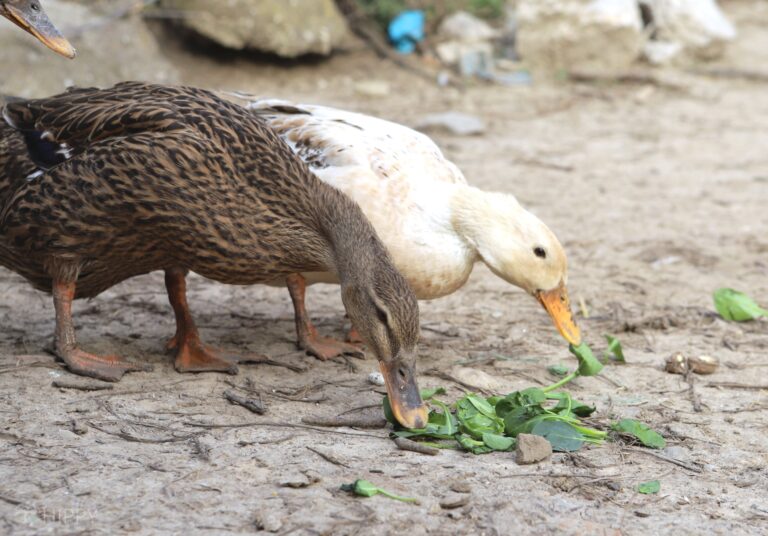
Spinach
Spinach is a leafy green that is supremely nutritious, but unfortunately, the high oxalate content has a nasty tendency to bind to calcium in ducks and cause problems with laying, and eventually skeletal issues.
You can feed this to your ducks, but do it very sparingly and preferably with other mixed greens.
Kale
Kale is another amazingly healthy leafy vegetable, but it has the same oxalate issues that spinach does above. The rule is small quantities no more than once a week.
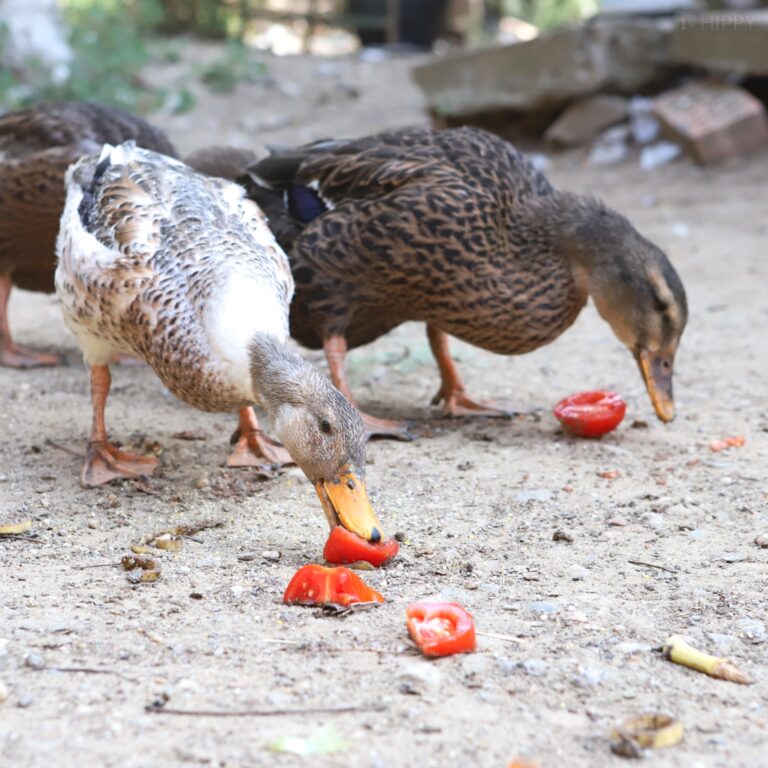
Tomatoes
Tomatoes are okay for ducks on a limited basis. They’re a wonderful source of vitamins, but too acidic for ducks to eat regularly. Also, ducks should never eat green tomatoes or any other part of the plant.
Iceberg Lettuce
I said up above that ducks can eat all kinds of lettuce, and that’s true, but iceberg lettuce is one that you should only feed them occasionally. Aside from being mostly devoid of nutrition, it contains a compound that tends to give ducks diarrhea.
Bread / Crackers
I know this is sacrilege to those of us who grew up near lakeside parks, but you really don’t want to give your birds any bread or crackers except on rare occasions as an indulgent treat.
Bread is difficult for them to digest, has a tendency to cause weight gain and health problems, and has basically no other nutritional value for birds. A small handful once in a while won’t hurt them, though.
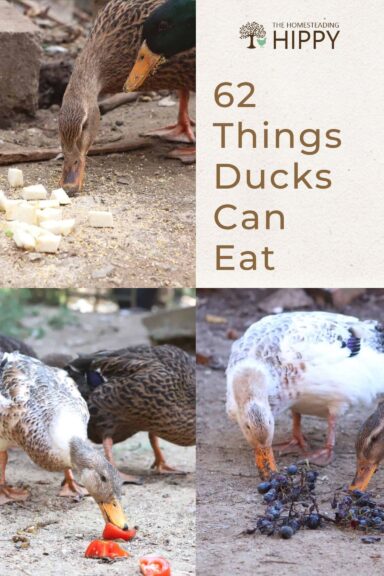
Tom has built and remodeled homes, generated his own electricity, grown his own food and more, all in quest of remaining as independent of society as possible. Now he shares his experiences and hard-earned lessons with readers around the country.
Find out more about the team here.
